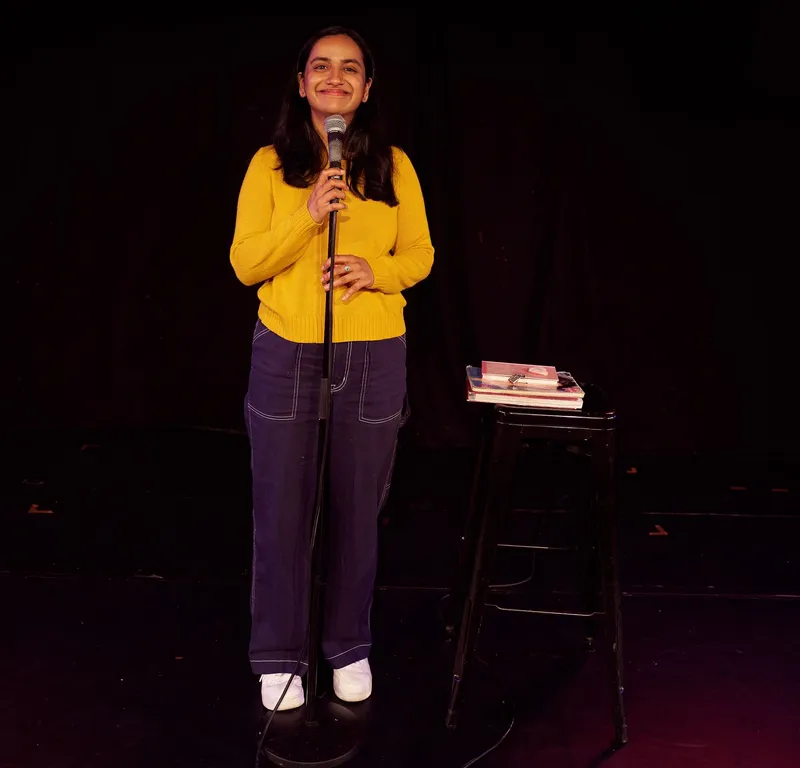We allow men to be mediocre, not women, says comic Urooj Ashfaq
Comic Urooj Ashfaq, who recently won the best newcomer award at the Edinburgh Fringe Festival, speaks about her journey, the learning curve, and how she’d take being cancelled over jail-time any day.
In August, comic Urooj Ashfaq won the best newcomer award for her show, Oh! No at the Edinburgh Fringe Festival, the first Indian woman to do so.
While riding the new high, she says she did not expect to win at all. “I was happy with the nomination as there are around 3,500 showcased at the fringe. Winning is a big act for a newcomer, and it felt great,” she tells YS Life.

Urooj Ashfaq
Following the win, Ashfaq was also featured as a guest on the Sloss and Humphries on the Road podcast by Daniel Sloss and Kai Humpries, two famous world-touring comics.
“What happens at the Fringe is that during the first two-three weeks, people experiment with the kind of shows they want to watch. Then it becomes a word-of-mouth thing, where they suggest what they liked to other people. One thing led to another, and Danny (Daniel) came to watch my show, and he had performed in India and had some context of the Indian comedy scene. Luckily, my show went off very well that day,” she says.
With this win, and the adulation and fame after, have women comics broken the mould, finally? Or are boys still having all the fun?
While this achievement calls for celebration, Ashfaq doesn’t want to take any credit for being a pioneer.
“I don’t think we are at a point at which women can take a bow. There have been far too many women who have put in the effort of being the first–whether it’s in standup, improv, or sketch. Sumukhi (Suresh) has scripted and acted in a fabulous show like Pushpavalli, Kaneez (Surka) has been on the scene for a long time,” she points out.
Women and the learning curve
When asked whether the number of women as compared to men in Indian comedy is lesser, she breaks it down using simple terms.
“For instance, if there are 100 men in comedy, they stand out because they have more acceptance and are forgiven more easily. If there are 50 women in comedy, only 10 will stand out because there’s a lack of acceptance because we allow men to be mediocre, not women,” she says.
Ashfaq says women comics are not spared when they make a mistake and so they go through a bigger and longer learning curve.
Also, because the comic scene is new in India, and people in the UK, the US or Australia have had a comedy culture, she hopes the lack of representation of India in the comic scene hopefully changes over time. Ashfaq wishes that everyone in the comedy scene be mindful of women and give them a platform, along with the acceptance of the audience.
Does that mean women comics have to work harder, not just at their craft but to change mindsets?
“In comedy, the main problem is people are used to seeing women being objectified or behaving maternally. It’s fine and you can capitalise on what you want. The only problem is that it pisses a large portion of the audience when they see a girl on stage because there’s an assumption in men, ‘mein isse better kar sakta hoon, yeh kya kar rahi hai’ (I can do better than this girl on stage). They don’t know what to do with a girl on stage who’s being funny, not objectifying herself or being maternal,” Ashfaq explains. After a while, one learns to cut off the noise and do what one likes best, she adds.
From a gap year to a career
In 2016, Ashfaq was applying to colleges for a master’s in psychology, but failed to get into any. She started performing at open mics along with her friend Sumaira Sheikh, who’s also a successful standup comic now. One thing led to another, and the duo began getting spots in clubs, writing jobs with AIB, and with Abish Mathew for Son of Abish. What was supposed to be a gap year before she joined a master’s turned into a full-time gig with comedy.

“We really loved it, the jokes–good, bad, inappropriate, funny, dark, senseless, silly–we felt the love for comedy in the way we probably didn’t feel for psychology,” she says.
Is it conscious that her comedy is targeted at Gen Z? Ashfaq says that her primary target audience is people between 18-34 years, who like to consume entertainment.
“When you are doing stand-up comedy, the first skill you have to nail is to be funny every 30 seconds consistently. I think it would need a real genius to nail this skill. And then it takes years to pander to a particular audience, it would make you mediocre, because you are a slave to the audience. We do have certain segments to engage with the audience,” she says.
In an age when comics are paying the price for speaking up, is the solution then to practise safe comedy?
“If the solution for comics is to practice safe comedy, it’s sad, right? Because this is a problem that doesn't really have a solution. And every individual gets to decide how much they are okay with sticking their neck out. The solutions are very personalised–some people are like, I'll say something, but I'll also get it vetted by a lawyer, so I know how much I can say. Others are like, I won't say anything. And that's fair.”
So, is it possible to follow the freedom of expression discourse when being cancelled is a possibility?
Ashfaq laughs.
“Being cancelled is the sweetest thing that can happen if jail time is the other possibility. I would love to be cancelled over pissing somebody off into filing an FIR!”
Edited by Megha Reddy







